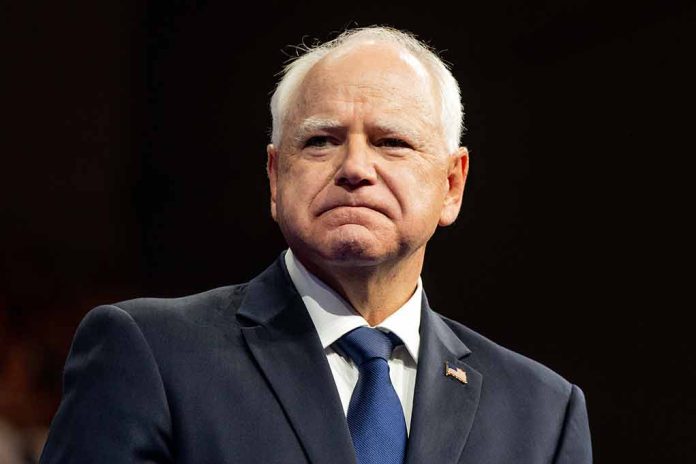
Minnesota Governor Tim Walz faces intense scrutiny over his role in freeing a convicted murderer who has since been arrested on drug and gun charges.
At a Glance
- Governor Tim Walz voted to commute the sentence of Myon Burrell, convicted of murdering 11-year-old Tyesha Edwards.
- Burrell was freed in 2020 after serving 18 years in prison.
- Since his release, Burrell has been arrested twice on drug and gun charges.
- The victim’s family expresses outrage over the commutation decision.
- The case raises questions about gubernatorial clemency and public safety.
The Original Crime and Conviction
In 2002, Myon Burrell, then 16, was convicted of first-degree murder for firing a stray bullet that killed 11-year-old Tyesha Edwards. The case, prosecuted by then-Hennepin County Attorney Amy Klobuchar, resulted in Burrell being sentenced to life in prison. Despite maintaining his innocence and refusing plea deals, Burrell was re-convicted in 2009 after the state Supreme Court initially set aside the original conviction.
Governor Walz’s Controversial Decision
In 2020, Governor Tim Walz, as a member of the Minnesota Board of Pardons, voted to commute Burrell’s sentence. Walz cited scientific and legal developments as justification for the decision. The governor argued that a life sentence for a teenage offender was excessive, urging recognition of changing times in criminal justice.
“We cannot turn a blind eye to the developments in science and law as we look at this case,” – Tim Walz, Minnesota Governor
The decision to commute Burrell’s sentence came after an Associated Press investigation raised doubts about the prosecution, citing a lack of physical evidence and inconsistent informant testimony. This renewed attention to the case coincided with Klobuchar’s 2020 presidential run and the Black Lives Matter protests, adding to its controversy.
How Tim Walz helped free a man convicted of murdering an 11-year-old girl… who was arrested on drug and gun crimes after his release https://t.co/OVEhiRTB7L pic.twitter.com/Lfn8HzDDtG
— Daily Mail Online (@MailOnline) August 9, 2024
Public Outcry and Family’s Response
The commutation of Burrell’s sentence has sparked significant public outcry, particularly from Tyesha Edwards’s family. The victim’s brother, Jimmie Edwards III, expressed deep disappointment and anger over the decision, emphasizing the permanent loss of his sister’s life and future.
“She never got to go to her prom. She never got to go to college. She never got to go to junior high school or high school,” he said. “Her life was taken away at 11. Who’s the victim?” – Jimmie Edwards III, Tyesha’s brother
The family’s distress highlights the ongoing debate between advocates for criminal justice reform and those who prioritize victims’ rights and public safety. This case has become a focal point in discussions about the appropriate use of executive clemency and its potential consequences.
Burrell’s Post-Release Troubles
The controversy surrounding Burrell’s release has been further intensified by his subsequent legal troubles. In September 2023, just three years after his release, Burrell was arrested during a traffic stop where police found a handgun and marijuana in his vehicle. This incident led to charges of gun and drug felonies, raising questions about the wisdom of his early release.
More recently, in May 2024, Burrell faced another arrest on drug charges. Police discovered illegal drugs and $60,000 in cash in his apartment, and he reportedly resisted arrest during the incident. These repeated offenses have reignited debate about the effectiveness of rehabilitation programs and the potential risks of commuting sentences for violent offenders.
Implications for Public Safety and Political Fallout
The Burrell case has become a lightning rod for criticism of Governor Walz’s approach to criminal justice. Critics argue that the governor’s decision has endangered public safety and undermined the judicial process. Supporters of clemency, however, contend that the case highlights the need for a more nuanced approach to juvenile sentencing and rehabilitation.
As Vice President Kamala Harris’s potential running mate, Governor Walz now faces increased scrutiny over his role in Burrell’s release. The case has become a political liability, forcing Walz to defend his decision-making process and commitment to public safety. The ongoing debate underscores the complex balance between justice reform and maintaining law and order, a challenge that continues to shape political discourse and policy decisions across the nation.
Sources:
- How Tim Walz helped free a man convicted of murdering an 11-year-old girl… who was arrested on drug and gun crimes after his release
- Minnesota Releases Myon Burrell, Man Given Life Sentence After a Murder
- ‘Clemency and mercy’: Minnesota to free Myon Burrell, convicted in 2002 death of 11-year-old girl
- Note from Rachel: Criminal Justice Reform Goes Mainstream
- Myon Burrell trial to begin this week, judge orders no cameras
- No cameras allowed in Myon Burrell trial















